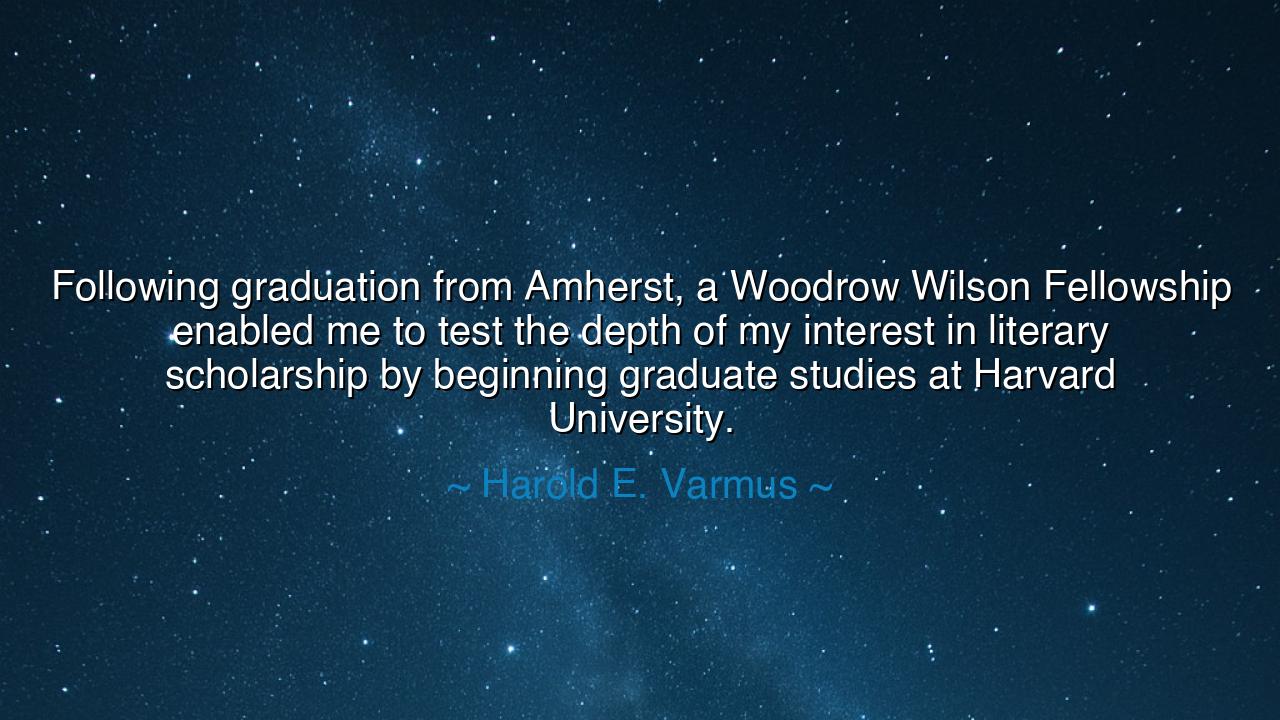
Following graduation from Amherst, a Woodrow Wilson Fellowship
Following graduation from Amherst, a Woodrow Wilson Fellowship enabled me to test the depth of my interest in literary scholarship by beginning graduate studies at Harvard University.






Hear now the reflective and measured words of Harold E. Varmus, a man whose life bridged the worlds of art and science, of language and discovery: “Following graduation from Amherst, a Woodrow Wilson Fellowship enabled me to test the depth of my interest in literary scholarship by beginning graduate studies at Harvard University.” At first glance, these words may seem the quiet record of a scholar’s early years. Yet, like the first brushstroke on a vast canvas, they conceal the deep power of curiosity, the courage to explore the unknown, and the humility to question one’s own purpose. In this sentence lies the ancient truth that life’s path is not found by certainty, but by the boldness to test the heart’s devotion.
The meaning of this reflection rests not in the names of great institutions — Amherst, Harvard, or the prestigious Woodrow Wilson Fellowship — but in the act of inquiry itself. For Varmus, this was not merely a passage from one school to another, but a step in the sacred pilgrimage of the intellect. To “test the depth” of one’s interest is to stand at the edge of the self and peer inward, asking not what one can achieve, but what one truly loves. Such testing is not easy, for it demands both courage and patience: the courage to begin when the end is uncertain, and the patience to accept that discovery may lead one elsewhere. Indeed, the path of Varmus, who began as a student of literature and would later become a Nobel Prize–winning scientist, reveals that testing one’s passions is not an act of hesitation, but of faith.
The origin of these words is grounded in the formative journey of a young scholar in mid-20th-century America, when the Woodrow Wilson Fellowship stood as a beacon for minds hungry for thought and expression. It offered freedom — the rare gift of time to study, to explore, to wander intellectually before the constraints of career and duty descended. In accepting that fellowship, Varmus chose not a profession, but a question: Is this what my life is meant for? It was a question as ancient as philosophy itself, echoing through the halls of every academy since Plato’s time — for the pursuit of truth, whether in words or in atoms, begins always with curiosity and the willingness to be changed by what one finds.
Consider, O listener, the story of Siddhartha Gautama, who left behind a palace of comfort to seek the meaning of existence. He did not know what he would find — only that he must search. His journey, too, began as a test, not of knowledge, but of desire: What do I truly seek? So it was with Harold Varmus. Though his early steps were taken in the halls of literature, his heart would later awaken to the great poetry of biology — the verses written not in ink, but in the code of life itself. The spirit that led him to Harvard to study literary art was the same spirit that would later lead him to the laboratory bench, to decipher the nature of cancer and the mysteries of the cell. Thus, the testing of one’s interest is not the sign of a wandering mind, but of a soul determined to find its true calling.
Varmus’s reflection also carries a lesson about the sacred continuity between disciplines. The literary scholar and the scientist are not opposites, but kin — both seek patterns, both pursue meaning, both wrestle with mystery. The wisdom of words and the precision of numbers are twin lights that illuminate the same human need to understand the world and ourselves. To begin in one and find fulfillment in another is not failure, but evolution. The young Varmus who studied literature was preparing the mind of the future scientist — for the same curiosity that reads a poem deeply is the curiosity that peers through a microscope and asks, What lives here?
The lesson, then, is this: let every person test the depths of their passion before surrendering to the shallow certainty of comfort. The world is vast, and the soul has many callings. Do not fear to begin a path that might change, for even the act of testing refines the spirit. The fellowship that enabled Varmus to study was not merely financial; it was a gift of time — time to question, to fail, to grow. Seek such moments in your own life: moments of honest exploration where your purpose is not given to you by others but discovered within yourself.
So, O reader, take heed of this truth: the beginning of wisdom is not knowing, but wondering. Whether you walk the path of art, or science, or faith, do as Harold Varmus once did — test the depth of your interest, for the heart that dares to question will one day find its home. And when you find it, you will know, as he did, that all disciplines, all journeys, and all graduations are but steps toward the same eternal purpose: to understand, to create, and to serve the unfolding beauty of knowledge itself.






AAdministratorAdministrator
Welcome, honored guests. Please leave a comment, we will respond soon